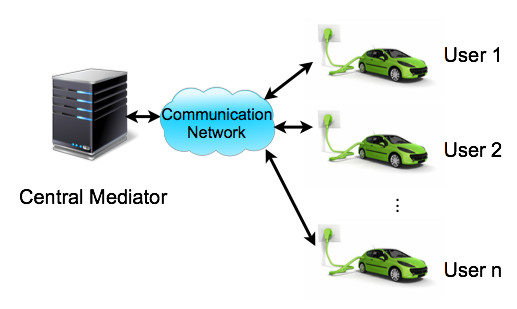Privacy in Networked Cyber-Physical Systems
Many decision making problems in the operation of networked infrastructures, such as electric vehicle charging, demand response, and traffic congestion reduction, can be viewed as a resource allocation problem with user participation. In these problems, a central entity needs to compute an allocation based on user preferences/requirements on the resources. These preferences or requirements often contain private and sensitive data that individual users wish to keep undisclosed from the public. Our work uses techniques in differential privacy and distributed optimization to develop algorithms for privacy-aware resource allocation. The result allows computing a nearly socially optimal resource allocation without compromising the privacy of participating users.

- Shuo Han and George J. Pappas, “Privacy in Control and Dynamical Systems,” Annual Review of Control, Robotics, and Autonomous Systems, vol. 1, no. 1, 2018. [pdf]
- Shuo Han, Ufuk Topcu, and George J. Pappas, “Differentially private distributed constrained optimization,” IEEE Transactions on Automatic Control, vol. 62, no. 1, pp. 50–64, 2017. [pdf]
- Shuo Han, Ufuk Topcu, and George J. Pappas, “An approximately truthful mechanism for electric vehicle charging via joint differential privacy,” in American Control Conference, 2015. [pdf]
- Shuo Han, Ufuk Topcu, and George J. Pappas, “Differentially private distributed protocol for electric vehicle charging,” in Annual Allerton Conference on Communication, Control, and Computing, 2014. [pdf]
- Shuo Han, Ufuk Topcu, and George J. Pappas, “Differentially private convex optimization with piecewise affine objectives,” in IEEE Conference on Decision and Control, 2014. [pdf]
- Fragkiskos Koufogiannis, Shuo Han, and George J. Pappas, “Computation of privacy-preserving prices in smart grids,” in IEEE Conference on Decision and Control, 2014. [pdf]